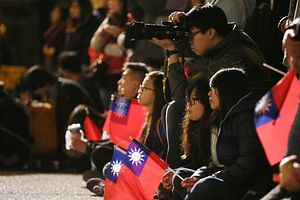Taiwan’s presidential office criticized China’s “26 measures” aimed at treating Taiwanese equally to Chinese nationals, saying they are an attempt to influence the country’s upcoming January elections.
China’s Taiwan Affairs Office said on Monday the new measures are aimed at facilitating “economic and cultural exchanges” between Taiwan and China. The measures include offering consular services and temporary passports to Taiwanese citizens and opening doors for Taiwanese companies to invest in Chinese projects.
Taiwan presidential office spokesperson Ting Yun-kung accused China of aiming to divide Taiwanese ahead of the country’s January elections, in which President Tsai Ing-wen faces a re-election challenge from the Beijing-friendly Kaohsiung mayor Han Kuo-yu.
The opposition Kuomintang, Han’s political party, welcomed the measures in a statement released on Tuesday, quoting the Taiwan Affairs Office release and saying it is happy to see Beijing provide “development opportunities” and “equal treatment” to Taiwanese citizens.
Beijing issued “31 measures” in 2018 aimed at removing restrictions on what is estimated to be over 1 million Taiwanese living and working in China. The new slate of measures is divided into 13 for Taiwanese citizens and 13 for Taiwanese companies doing business in China.
Along with the two sets of measures – bringing the current total to 57 – Beijing began offering Taiwan citizens residence permits last September. As of May, about 100,000 Taiwanese nationals had applied for the permits despite proposed punitive measures on card holders, according to Mainland Affairs Council minister Chen Ming-tong.
Scholars in Taiwan have been skeptical of the economic impact of China’s initial 31 measures. Young Taiwanese often seek employment outside of the country, and while China remains an attractive destination due to higher salaries and more diverse professional opportunities, experts do not believe the incentives lead Taiwanese nationals to support unification or Beijing’s “one country, two systems” formula for Taiwan.
Taiwanese investors have shifted from China to other countries in response to the ongoing U.S.-China trade war, leaving China likely eager to attract companies and individuals.
On Monday, experts told the English-language Taipei Times China’s offer of temporary passports would likely be of little use to Taiwanese travelers, who already hold more powerful passports allowing visa-free travel to over twice as many nations as Chinese passports.
In its statement, the Taiwan Affairs Office said the measures would let Taiwanese companies invest or participate in a widened array of projects, including 5G and civil aviation. Companies will also be permitted to issue bonds to raise capital, according to the statement.
The announcement comes just over two months before a crucial election in which the Kuomintang (KMT) is challenging Tsai Ing-wen’s Democratic Progressive Party (DPP) for both the presidency and the country’s legislative majority.
In the past three months, China has suspended individual travel permits to Taiwan and has coaxed two of Taipei’s remaining diplomatic allies, Kiribati and the Solomon Islands, to switch recognition to Beijing. It has also continued to pressure international companies, including Maserati, to distance themselves from Taiwan or list Taiwan as a province of China on websites and other materials.
Despite this, the Beijing-skeptical Tsai remains far ahead of Han in opinion polls as Han has lost much of the luster that, earlier this year, made him a favorite for the presidency.
Tsai’s DPP currently holds a legislative majority, but polls suggest that its hold on the majority may be tenuous. The KMT, however, faces an uphill battle to gain a majority of its own. A handful of third parties, most prominently Taipei mayor Ko Wen-je’s newly formed Taiwan People’s Party, figure to win enough seats to potentially keep any single party from earning a majority in the legislature.
The KMT, which won several mayoral seats in last November’s regional elections, has prioritized warmer cross-strait ties with China, and some newly elected mayors announced their intentions to hold city-to-city exchange forums with Chinese cities. Han, as mayor of Kaohsiung, traveled to Hong Kong, Macau, and mainland China in March, where he discussed trade partnerships with Chinese government officials.
The KMT has also spoken of a potential cross-strait peace treaty with Beijing, an idea that has been heavily criticized by the Tsai administration and its supporters, who believe such a treaty could infringe upon Taiwan’s sovereignty.
Taiwanese remain skeptical of China’s motives, however, and polls consistently show that members of both major parties value their own democracy and reject Beijing’s “one country, two systems” proposal for Taiwan.

































